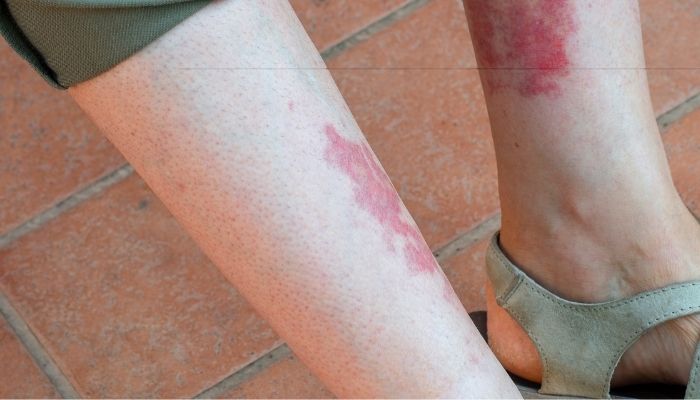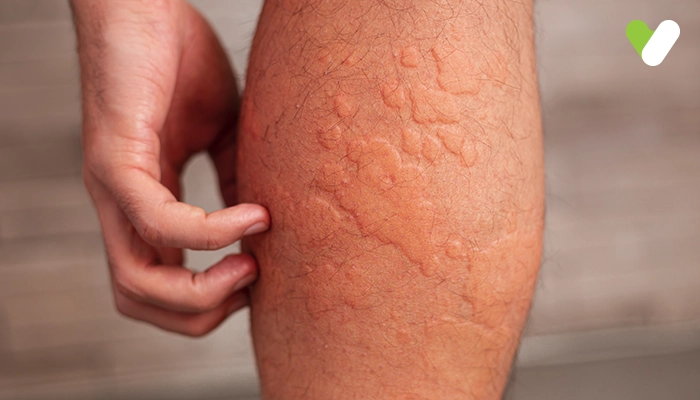Vasculitis is an inflammation of blood vessels that can affect any blood vessel irrespective of their sizes. Due to the inflammation, the walls of the blood vessels get contracted which minimizes the thickness of the passage through the vessel. Vasculitis may happen to just one or several organs. The condition could be either short-term or long-lasting.

Though vasculitis may affect anyone, certain types are more common among some age groups.
Vasculitis Symptoms
General signs and symptoms of vasculitis are:- Fever
- Headache
- Fatigue
- Weight loss
- Body aches and pains
- Digestive System:
- If vasculitis happens to your stomach or intestines, you may experience severe pain after eating. Peptic Ulcers and perforations may also occur and as a result, you may get blood in the stool.
- Ears:
- Dizziness, ringing in the ears (Tinnitus) and sudden hearing loss may happen.
- Eyes: Due to vasculitis, your eye may turn red and itch or burn. You may suffer from double vision and temporary or permanent blindness in one or both eyes due to giant. This could be the first sign of the disease.
- Hands or feet: Sometimes, you may experience numbness or weakness in a hand or foot due to vasculitis. The palms of the hands and soles of the feet may get swollen.
- Lungs: You may experience shortness of breath or blood in the cough if vasculitis affects your lungs.
- Skin: Red spots may appear due to bleeding under the skin. You may get lumps or open sores on your skin due to vasculitis.
Vasculitis Causes
The accurate cause of vasculitis is not yet completely revealed. Some types of vasculitis are associated with a person's genetic makeup. Others may occur when your immune system attacks your own blood vessels by mistake. Possible triggers for this immune system reaction could be,- Infections, including hepatitis B and hepatitis C
- Blood cancers
- Immune system diseases, such as rheumatoid arthritis, lupus and scleroderma
- Reactions to certain drugs
Risk Factors
Anyone can get vasculitis. Factors that will uplift certain disorders are:- Age: Giant cell arteritis hardly appears before the age of 50, while Kawasaki disease is most common in children younger than 5 years old.
- Family History: Behcet's disease, granulomatosis with polyangiitis and Kawasaki disease can be inherited from family members.
- Lifestyle choices: If you consume cocaine, then this will enhance your risk of developing vasculitis. Smoking tobacco (if you are a man below 45 years) may also increase your risk of developing Buerger's disease.
- Medications: Some medications such as hydralazine, allopurinol, minocycline and propylthiouracil may trigger your vasculitis
- Infections: Having hepatitis B or C may enhance your risk of vasculitis.
- Immune Disorders: People who have immune system disorders (where your immune system mistakenly attacks your own bodies) are more prone to the risk of vasculitis. Examples include lupus, rheumatoid arthritis and scleroderma.
- Sex: Women have giant cell arteries, while Buerger's disease is more common in men.
Vasculitis is diagnosed based on your medical history, present symptoms, complete physical examination and your laboratory test reports. By checking your blood abnormalities, your doctor can decide whether you have vasculitis or not. These abnormalities are:
- Anemia (low red blood cell count)
- A high white blood cell count
- A high platelet count
- Signs of kidney or liver problems
Vasculitis Types
1. Behcet’s Disease
In this disease, you may have the triad of mouth ulcers, genital ulcers, and eye inflammation. Sometimes, it may affect other organs.2. Buerger’s Disease (Thromboangiitis Obliterans)
This is more evident in smokers. Here blood flow gets decreased to the hands and feet.3. Eosinophilic Granulomatosis with Polyangiitis (EGPA, formerly known as Churg Strauss)
This type of disease is related to asthma, nasal polyps, sinusitis, elevated eosinophil counts, and vasculitis. It mainly occurs in your lungs, peripheral nerves, skin, kidneys, and heart.4. Cryoglobulinemia
This type of disease is associated with hepatitis C virus infections or paraproteinemias.5. Giant Cell Arteritis
Earlier it was called “temporal arteritis”, and is the most common type of vasculitis in America. This occurs mainly in people who are above 50 years. If you have this type of vasculitis, you may suffer from fever, headache, and jaw/scalp pain.6. Henoch-Schönlein Purpura
You may get this disorder after a respiratory tract infection and it is self-limited.7. Microscopic Polyangiitis
It is a systemic vasculitis that attacks only small and medium-sized blood vessels. It is related to the autoantibody, ANCA.8. Polyarteritis Nodosa
This type of vasculitis occurs in different organ systems and is focused on medium-sized arteries.9. Rheumatoid Vasculitis
This type of vasculitis is associated with patients who have a history of severe RA.10. Takayasu’s Arteritis
This large vessel vasculitis affects the aorta and, in some cases, internal organs. It is common among women (less than 50 years).11. Granulomatosis with Polyangiitis (GPA, formerly known as Wegener’s)
This vasculitis occurs in the lungs, kidneys, upper respiratory tract, and other organs and is also linked with autoantibody, ANCA.Treatment
The core purpose of the treatment method is to reduce inflammation and manage underlying conditions that will trigger your vasculitis.Medications
A corticosteroid medication like prednisone is the most recommended drug to minimize the inflammation related to vasculitis.But corticosteroid side effects could be severe if you need to take them for a longer time. Possible side effects are weight gain, diabetes and depreciated bones. If you need to take corticosteroid medication for long-term therapy, you will receive the lowest dose possible.
Other medications you may require to manage inflammation so that the dosage of corticosteroids can act quickly. Depending on what types of vasculitis you have, your doctor will suggest the medications. These medications could be methotrexate (Trexall), azathioprine (Imuran, Azasan), mycophenolate (CellCept), cyclophosphamide, tocilizumab (Actemra) or rituximab (Rituxan).
The dosage will depend on the type and severity of vasculitis you have, which organs are affected and any other underlying health issues.


